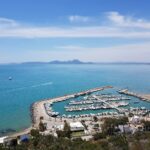With the rise of digital nomadism and remote work, professionals worldwide are seeking affordable, scenic, and well-connected destinations to live and work. Tunisia stands out as an ideal choice, offering a unique blend of Mediterranean charm, low living costs, and a welcoming environment for expats.
In this comprehensive guide, we’ll explore why Tunisia is a top destination for remote workers, covering:
- Affordable Cost of Living
- High-Speed Internet & Coworking Spaces
- Visa & Residency Options for Digital Nomads
- Beautiful Locations to Live & Work
- Safety & Quality of Life
- Cultural Richness & Travel Opportunities
- Tax Benefits for Foreigners
- Challenges & How to Overcome Them
By the end, you’ll see why Tunisia is a hidden gem for remote professionals.
1. Affordable Cost of Living
One of the biggest draws for remote workers is Tunisia’s low cost of living, which is significantly cheaper than Europe or North America while still offering a high quality of life.
Monthly Budget Breakdown (USD/EUR)
| Expense | Cost (USD) | Cost (EUR) |
|---|---|---|
| Rent (1-bed apartment, city center) | $300 – $500 | €280 – €470 |
| Utilities (electricity, water, internet) | $80 – $150 | €75 – €140 |
| Groceries (per month) | $150 – $250 | €140 – €230 |
| Eating Out (meal at a mid-range restaurant) | $5 – $10 | €4.50 – €9 |
| Coworking Space (monthly membership) | $50 – $100 | €45 – €90 |
| Public Transport (monthly pass) | $15 – $25 | €14 – €23 |
Compared to European cities like Barcelona, Lisbon, or Berlin, Tunisia offers 50-70% savings on living expenses while maintaining a comfortable lifestyle.
2. High-Speed Internet & Coworking Spaces
A remote worker’s biggest concern is reliable internet. Tunisia delivers with:
- Fiber-optic broadband (up to 100 Mbps) available in major cities.
- Affordable mobile data (4G/LTE coverage is widespread).
- Coworking spaces in Tunis, Sousse, and Hammamet.
Top Coworking Hubs in Tunisia
- Cogite (Tunis) – A leading space with a vibrant expat community.
- The Dot (Tunis) – Modern facilities with networking events.
- Kwerk (Sousse) – A relaxed beachside workspace.
Internet speeds average 20-50 Mbps, sufficient for video calls, streaming, and cloud-based work.
3. Visa & Residency Options for Digital Nomads
Tunisia is visa-friendly for many nationalities, with straightforward residency options:
Tourist Visa (90 Days)
- Most Western nationals (EU, US, Canada) get a free 90-day visa on arrival.
- Extendable for another 3 months by leaving and re-entering (e.g., via Italy or Malta).
Long-Term Residency (1 Year+)
- Property Purchase Residency: Buy real estate (minimum ~$70,000) for a renewable 1-year residency.
- Freelancer/Remote Work Visa: Tunisia is developing a digital nomad visa (expected 2024).
- Retirement Visa: Available for those with a stable pension.
Tax Benefits
- No foreign income tax for remote workers (if income is earned outside Tunisia).
- Low property taxes compared to Europe.
4. Best Cities for Remote Workers
Tunis (Capital City)
✅ Best for networking & coworking spaces
✅ Fast internet & international amenities
✅ Close to Carthage ruins & Mediterranean beaches
Sousse (Coastal Hub)
✅ Affordable beachfront living
✅ Lively medina & digital nomad community
✅ Great cafes with sea views
Hammamet (Resort Town)
✅ Relaxed vibe, perfect for work-life balance
✅ Luxury villas at low costs
✅ Close to golf resorts & spas
Djerba (Island Paradise)
✅ Exotic island lifestyle
✅ Low tourist crowds outside summer
✅ Strong expat community
5. Safety & Quality of Life
Tunisia is safer than many think:
- Low violent crime (petty theft exists, like in any tourist area).
- Friendly locals who respect foreigners.
- Good healthcare (private clinics in Tunis & Sousse are affordable).
Healthcare Costs
- Doctor visit: $20-$50
- Dental cleaning: $30-$70
- Health insurance: $50-$150/month (international coverage recommended).
6. Cultural Richness & Travel Opportunities
Tunisia blends Arab, African, and Mediterranean cultures, offering:
- Ancient Roman ruins (Dougga, El Jem).
- Sahara Desert adventures (star-gazing, camel treks).
- Mediterranean beaches (less crowded than Spain or Greece).
Weekend Getaways
- Sidi Bou Said (Blue-and-white village near Tunis).
- Matmata (Underground “Star Wars” homes).
- Kairouan (UNESCO-listed Islamic heritage site).
7. Tax Benefits for Foreigners
- No tax on foreign-earned income (if not remitted to Tunisia).
- Property taxes are low (~0.5% of property value per year).
- VAT refunds for expats on certain purchases.
8. Challenges & How to Overcome Them
Language Barrier
- Solution: Learn basic French/Arabic; many young Tunisians speak English.
Bureaucracy
- Solution: Hire a local fixer for residency paperwork.
Summer Heat
- Solution: Coastal cities like Hammamet have breezy weather.
Final Verdict: Is Tunisia Good for Remote Work?
✅ Yes, if you want:
✔ Affordable Mediterranean living
✔ Reliable internet & coworking spaces
✔ Rich culture & travel opportunities
✔ Easy visa policies
🚫 No, if you prefer:
✖ Fast-paced city life (like Dubai or Singapore)
✖ Extreme luxury (though high-end options exist)
Best For:
- Freelancers & digital nomads on a budget.
- Retirees seeking a sunny, low-cost lifestyle.
- Adventure seekers who love history & nature.
Next Steps: Moving to Tunisia
- Visit on a tourist visa (90 days) to test the waters.
- Rent before buying (ideal areas: Tunis, Sousse, Hammamet).
- Join expat groups (Facebook, Meetup) for support.
With its low costs, sunny climate, and welcoming culture, Tunisia is a hidden paradise for remote workers. Ready to make the move?
Would you consider Tunisia for remote work? Share your thoughts in the comments!



